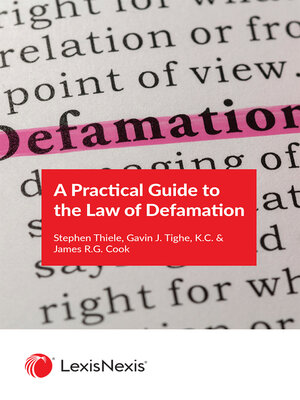
Sign up to save your library
With an OverDrive account, you can save your favorite libraries for at-a-glance information about availability. Find out more about OverDrive accounts.
Find this title in Libby, the library reading app by OverDrive.



Search for a digital library with this title
Title found at these libraries:
| Library Name | Distance |
|---|---|
| Loading... |
Defamation cases have been on the rise in Canada. While the use of social media platforms has exploded over the last decade, the law has struggled to uphold free speech while protecting the reputations of those targeted by online defamatory abuse.
Defamation law is an area in which lawyers and litigants can get twisted out of the shape by the elements, tests and shifting burdens of proof that can apply to a specific case. These elements, tests and shifting burdens can cause confusion, particularly for those who are inexperienced with the law. Misinterpreting tests or ignoring important statutory provisions can make a significant difference in a case. In some cases, the failure to comply with mandatory notice requirements can be fatal to a claim.
A Practical Guide to the Law of Defamation aims to offer practical guidance on current and developing defamation law in Canada. It lays out the most prominent cases, prevalent legal principles, the courts that rely upon them, and gaps in the law. It further explains the tests and elements that must be met in order to make a claim or prepare a defence against defamation.
This new publication also includes a useful table of cases and precedents to help prepare a formal notice of libel, statement of claim, SLAPP motion or moving party factum anti-SLAPP motion.
Topics Covered
Who Should Read This Book







